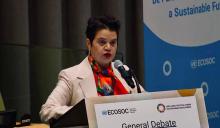STATEMENT BY H.E. AMBASSADOR NOEMÍ ESPINOZA MADRID, SECRETARY-GENERAL, ON THE OCCASION OF THE ASSOCIATION OF CARIBBEAN STATES HIGH-LEVEL BREAKFAST OF CLIMATE MOBILITY CHAMPIONS: “HARNESSING CLIMATE MOBILITY FOR ADAPTATION AND RESILIENCE”
Excellencies,
H.E. Prime Minister Feleti Teo of Tuvalu
H.E. Prime Minister Terrance Drew of Saint Kitts and Nevis
H.E. Prime Minister Américo d'Oliveira dos Ramos of Sao Tome and Principe
H.E. President Surangel Whipps Jr. of the Republic of Palau
It is an honor to address you on behalf of the secretariat of the Association of Caribbean States (ACS). Let me begin by thanking the Global Centre for Climate Mobility for convening this event, and for recognizing the leadership of those who have made climate mobility an essential part of the global adaptation and resilience agenda. The ACS brings together 35 countries and territories of the Greater Caribbean with a shared mission: to foster consultation, cooperation, and concerted action, and with a special
responsibility — to protect and sustainably develop our common heritage, the Caribbean Sea. We are a region diverse in languages, cultures, and histories, united by a sea that connects us and reminds us that our destinies are intertwined. Yet, just as we share the richness of our diversity, we also share the profound challenge of the climate crisis. More frequent and intense hurricanes, prolonged droughts, coastal erosion, and phenomena such as sargassum affect our economies, our ecosystems, and above all, the daily lives of our communities. In this context, climate mobility has become a critical dimension of both our present and our future. We know this well: behind every figure of climate displacement are lives, families, and communities. We are not speaking of abstract statistics — we are speaking of fishers who see their livelihoods disappear, of young people forced to migrate in search of safety and opportunity, of women who face heightened risks in displacement, of entire communities confronted with the choice of staying or moving under existential threats. This is why the ACS promotes a people-centered, rights-based approach — one that places human dignity at the core and recognizes the role of communities as agents of resilience. Communities of the Greater Caribbean are not only vulnerable; they are keepers of knowledge, guardians of the sea and land, and innovators of solutions.
The Greater Caribbean is not starting from zero. We have taken important steps, such as creating the Sargassum Sub-Commission, a regional coordination mechanism for a transboundary phenomenon. We also launched, in 2022, with the Global Centre for Climate Mobility, the Greater Caribbean Climate Mobility Initiative, which has helped us assess risks and propose a people-centered Action Agenda. Added to this are the Advisory Opinion of the Inter-American Court of Human Rights on climate change and human rights, and today, the Greater Caribbean Climate Mobility Report, providing concrete evidence to guide our collective decisions. But frameworks alone are not enough. What is required is political will and international responsibility-sharing. The Greater Caribbean is not the main driver of this crisis, yet it remains among the regions most severely affected. We need climate finance that recognizes mobility as a priority area for investment. The road to COP30 in Belém do Pará is a decisive opportunity. The Greater Caribbean must arrive with a strong and united voice to ensure our priorities are placed at the center of the global agenda. We bring three clear messages:
Mobility must no longer be seen as an inevitable consequence but embraced as a strategic component of resilience and climate justice, and as an opportunity to plan ahead, protect lives, and strengthen our communities.
The Greater Caribbean must be recognized not only as a vulnerable region but also asa source of knowledge and experience valuable to the world. And within this resilience, the role of women must be acknowledged — community leaders, caregivers, and innovators who sustain life under the harshest conditions, and who must be at the center of adaptation and mobility responses.
We have the responsibility to build strong alliances and mobilize resources, because no country can face the magnitude of this challenge alone. Allow me to underline one key point : climate mobility is, above all, a human rights issue. Those who are displaced must be recognized not only as people in need of protection, but as agents of resilience with the right to decide, to participate, and to build their future in dignity. Excellencies, this must be the compass that guides not only our commitments but our concrete actions, enabling us to shape a present that leads to a dignified future of well-being.
Thank you.
Discursos relacionados
Intervención de la Secretaria General en la 1ª Reunión de la Subcomisión de Sargazo
Excelencias,
Distinguidas y distinguidos expertos
Palabras de la Secretaria General durante la en el Diálogo de Altas Autoridades sobre la sociedad del cuidado: gobernanza, economía política y diálogo social para una transformación con igualdad de género - XVI Conferencia Regional sobre la mujer de ALC
Excelencias,
Distinguidas delegaciones,
Remarks by Ms. Erica Fortune, Acting Permanent Secretary, Ministry of Foreign and CARICOM Affairs of the Republic of Trinidad and Tobago at the ACS 31st Anniversary Cocktail Reception
It is my distinct pleasure to join you this evening to dually celebrate the 31st Anniversary of the Association of Caribbean States, as well as the 31st Anniversary of Diplomatic Relations between Trinidad and Tobago and Panama.
Intervención de Noemí Espinoza Madrid, Secretaria General de la AEC, en el Debate General del Foro Político de Alto Nivel sobre Desarrollo Sostenible 2025
Excelencias,
Honorables delegaciones,
Les saludo en nombre de la Asociación de Estados del Caribe (AEC), mecanismo regional intergubernamental que reúne a los 35 países que conforman el Gran Caribe.





